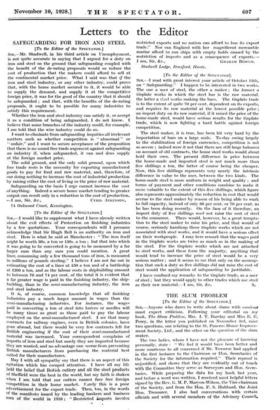Letters to the Editor
SAFEGUARDING FOR IRON AND STEEL
[To the Editor of the SPECTATOR.] Snl„—Mr. Shadwell, in his third article on Unemployment, is not -quite accurate in saying that I argued for a duty on iron and steel on the ground that safeguarding coupled with the benefit of the de-rating proposals would so reduce the cost of production that the makers could afford to sell at the continental market price. What I said was that if the iron and steel industry, or any other industry, could prove that, with the home market secured to it, it would be able to supply the demand, and supply it at the competitive foreign price, it was for the good of the country that it should be safeguarded ; and that, with the benefits of the de-rating proposals, it ought to be possible for many industries to satisfy this requirement.
Whether the iron and steel industry can satisfy it, or accept it as a condition of being safeguarded, I do. not know. I believe that some branches of the industry could, for example, I am told that the wire industry could do so.
I want to eliminate from safeguarding inquiries all irrelevant matters such as whether competition is " abnormal " or unfair,"' and I want to secure acceptance of the proposition that there is no sound free trade argument against safeguarding an industry if, when safeguarded, it can and does supply at the foreign market price.
• The solid ground, and the only solid ground, upon which free trade rests is the necessity for exporting manufactured goods to pay for food and raw material, and, therefore, of our doing nothing to increase the-cost of industrial production by raising either the cost of living or the price of raw material.
Safeguarding on the basis I urge cannot increase the cost of anything. Indeed a secure home market tending to greater output can result only in a reduction in the cost of production.












































 Previous page
Previous page